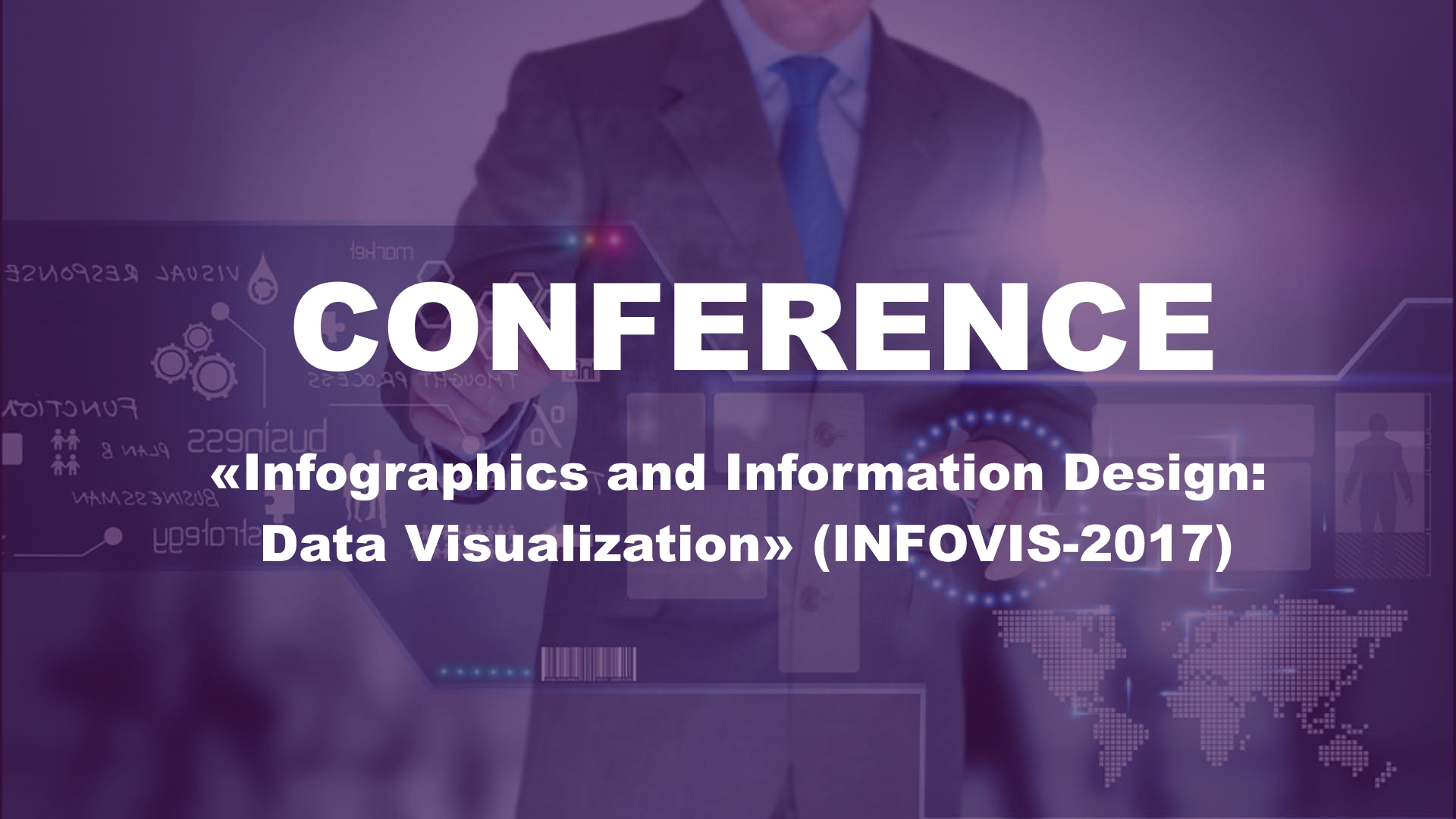Event Information .
About the event .
CONFERENCE «Infographics and Information Design: Data Visualization»
17th and 18th of November 2017 hosted by Omsk State Technical University the International scientific conference ``Infographics and Information Design: Data Visualization`` (INFOVIS-2017) was held. This conference has been organized jointly with SangMyung University (The Republic of Korea) supported by Ministry of Education of Omsk region.
This conference is dedicated to establishing cooperation of researchers from around the world, providing a unique communication for knowledge sharing about information visualization in various fields of research.

Section 1 .
Infographics as universal method of visualization information
Scientific researches on different kinds of topics connected with information visualization. Papers on data representation and interaction techniques, models or theories related to visualization of information, visual data analysis or applications of information visualization systems on problem-oriented approach are accepted.
— graphs (networks), trees (hierarchies), and other relational data
— high-dimensional data and dimensionality reduction
— heterogeneous data
— personal or social data (health, energy, finance, fitness, email, etc.)
— non-numeric data (categorical data, nominal data, etc.)
— causality and uncertainty data
— time-series & temporal event data
— spatial data, particularly visualized with a new spatial mapping
— combinations of abstract and spatial data
— streaming or time-varying data
— very large datasets
— reports on information visualization in domains where it has impact
— using information visualization for education and teaching
— design studies
Section 2 .
Information design and visualization in research projects
New research idea and innovative applications in scientific issues development and visualization areas including both research reports on scientific visualization and achievements in solving nowadays problems in different science research areas.
— Scalar, vector and tensor fields
— Multidimensional multi-field, multi-modal, and multivariate data,
— Time-varying data
— Regular and unstructured grids
— Point-based data
— Volumetric data
— Streaming data
— System and toolkit design
— Topology-based and geometry-based techniques
— Feature extraction and pattern analysis
— Uncertainty visualization
— View-dependent visualization
— Glyph-based techniques
— Integrating spatial and non-spatial data visualization
— Large-scale computing
— Storage and data analytics
— Distributed, cluster, and grid computing
— Scalable data management on and off the cloud
— High-performance computing on multi-core, GPUs and embedded devices
— Information extraction and knowledge discovery from big data
— Application of computer vision techniques
— Statistical modeling
— Clustering techniques
— Large and high-res displays
— Giga-pixel displays
— Wrist displays/wearable displays
— Stereo displays
— Immersive and virtual environments
— Mixed and augmented visualization
— Projector-camera systems
— Small displays
— Mobile Devices
— Mathematics, physical sciences and engineering
— Earth, space, and environmental sciences
— Terrain visualization
— Geographic/geospatial visualization
— Molecular, biomedical and medical visualization
— Bioinformatics visualization
— Software visualization
— Business and finance visualization
— Social and information sciences
— Education
— Humanities
— Multimedia (image/video/music)
— Nano-technologies
— Robotics
— Sensor networks
— Cybersecurity
— Computational architecture
Section 3 .
Cultural Informatics and Digital Cultural Heritage
Scientific researches on different kinds of topics connected with information technologies usage for cultural heritage reconstruction and visualization, cultural heritage preservation visualization techniques.
— Digital Data Acquisition Technologies
— 2D and 3D Data Capture Methodologies and Data Processing
— CAD and FEM based Digital Reconstructions and 3D Modelling
— Reproduction Techniques and Rapid Prototyping
— Visualization Techniques
— Non-Photorealistic Rendering of Cultural Heritage Data
— Virtual Museum Applications (e-Museums and e-Exhibitions)
— e-Libraries and e-Archives in Cultural Heritage
Section 4 .
Designing and embodying emotional contents
Scientific researches on studying emotion nature and emotional theories application both to informational product design and to informational technologies in general. Also reports on new concepts for both technology improvement taking into account emotional mechanisms and getting visual results representation (emotions expression) are accepted.
— Uni- or multimodal recognition of emotion from face, body, gesture, voice text or physiology
— Face emotions / body animation
— Expression and gesture recognition
— Sentiment analysis
— Emotional speech synthesis, modeling and animation, synthesis of auditory emotion bursts, synthesis of multimodal affective behavior
— Brain-computer interfaces, design of affective loop and affective dialog systems
— Mobile, tangible, haptic and virtual/augmented interfaces
— Affectively-smart environments
— Cognitive affective models
— Models of moral decision-making
— Tools for social science research
— Computational models of emotion
— Psychological factors in affective computing (personality, culture)
— Emotions in robot cognition and action
— Affective virtual agents
— Memory, reasoning, and learning of affective systems
— Affective architectures for virtual & robotic systems
— Databases and tools
— Biometrics
— Medical
— Assistive
— Virtual Reality
— Entertainment
— Education
— Ambient intelligence
Program Committee .
Program Committee includes researchers and scientists working in universities and research centers both from Russia and overseas.
Lozhnikov Pavel, Chairman, Head of the Information Department, Omsk State Technical University
Choi Hee Soo, co-chairman, Professor of Department of Historical Content, Sang Myung University
Hwang Min Chul, Professor of Department of Emotional Technology, SangMyung University
Choi Jong Myung, Professor of Department of Computer Engineering, MokPo National University
Ko, Hoon, Professor of Department of Computer Engineering, SungKyunKwan University
Kim SangHeon, Professor of Department of Historical Content, SangMyung University
Zykina Anna, Professor, Head of Department «Applied Mathematics and Fundamental Informatics» , Omsk State Technical University
Batenkina Oksana, Professor of Department «Design and Technologies of Media Industry», Omsk State Technical University

